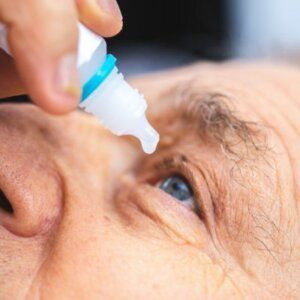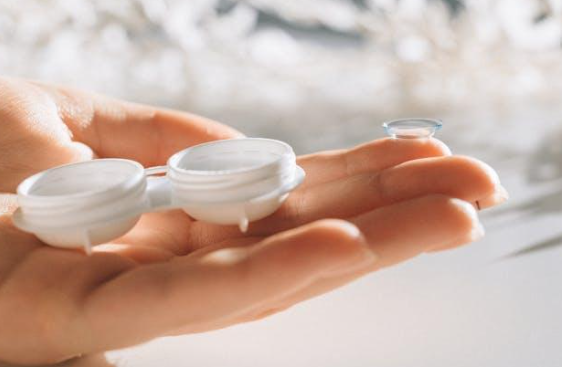Presbyopia Eye Drops: How They May Be Able to Benefit You
As you age, the lens of your eye begins to stiffen and become less flexible. This results in
presbyopia
— a condition that makes close-up objects appear blurry. Presbyopia is one of many age-related conditions that affect your vision. Reading glasses and prescription eyewear have long been the solution to this problem. However, presbyopia eye drops are becoming available to help some people see without the need for corrective eyewear.
condition that makes close-up objects appear blurry. Presbyopia is one of many age-related conditions that affect your vision. Reading glasses and prescription eyewear have long been the solution to this problem. However, presbyopia eye drops are becoming available to help some people see without the need for corrective eyewear.
Currently, Vuity from Allergan is the only FDA-approved Presbyopia eye drop on the market. Vuity drops are miotics and work by shrinking the pupil of your eye to improve your near vision.
What Are Presbyopia Eye Drops?
Presbyopia eye drops are designed to treat the effects of aging on your near vision. They may reduce your need for reading glasses and other eyewear that help you see better as you age.
There are two types of eye drops that are currently being studied to treat the condition:
- Lens-softening eye drops
- Miotic eye drops
Lens-softening eye drops aim to help the lens of your eye become more flexible as well as more able to focus on close-up objects. They may also slow down presbyopia’s natural progression as you age. However, they work best if you are in the early stages of presbyopia. Miotics help strengthen your distance and near vision by shrinking the pupil of your eye, causing a ‘pinhole effect’ and improving near vision.
Are Presbyopia Eye Drops Available in Knoxville?
While several presbyopia eye drops are currently in the clinical trial phase, only one has received FDA approval so far — Vuity from Allergan. Vuit is currently the only FDA-approved eye drop to treat presbyopia.
It is a miotic eye drop that uses a diluted form of pilocarpine to shrink the pupil to improve the function of your eyes. Pilocarpine is a common eye care therapeutic that is also used in eye drops for glaucoma. With Vuity, the solution is delivered using proprietary pHast technology so it can easily adjust to the pH of your eye’s tear film.
In some patients, Vuity drops are able to treat age-related blurry near vision from presbyopia in about 15 minutes and may last for around six hours. Participants aged 40 to 55 took part in the clinical trials. Adverse events (side effects) were minimal and consisted primarily of headache and eye redness.
Presbyopia eye drops can’t reverse the aging process and effects of presbyopia. However, they may help improve your near-distance vision and reduce your need for reading glasses and other types of corrective lenses.
What Is Presbyopia?
Presbyopia is an age-related eye condition that affects your ability to focus on nearby objects. It’s a natural part of aging, meaning that everyone will eventually develop the condition. The condition often becomes noticeable in your 40s and continues to progress until your mid-60s. Most patients notice it when they struggle to make out fine details unless held at arm’s length.
Click here to learn more about age-related eye conditions!
Presbyopia Symptoms
Presbyopia develops gradually so you may not notice any symptoms at first. The most common tell-tale sign is difficulty seeing close-up objects. This could be reading a book, magazine, or phone. These objects may appear blurry, requiring you to hold them at arm’s length or move further away. This can result in headaches and eye strain from trying to compensate.
Feeling tired or working in low light can make your symptoms worse. These symptoms will only get worse over time, often leveling out around the age of 65. That’s why it’s important to schedule an appointment with one of our doctors when you first notice the signs of presbyopia. They will be able to identify the problem and develop a treatment plan to help you see clearly.
How Is Presbyopia Diagnosed?
Comprehensive eye exams are the best method for diagnosing presbyopia and other age-related eye conditions. They allow our Knoxville eye surgeons to view the inner structures of your eyes and catch eye conditions that can go unnoticed with regular eye exams. We recommend getting these in-depth exams starting at age 40 to catch issues in their early stages.
To read our exhaustive guide to comprehensive eye exams in Knoxville, click here !
What Causes Presbyopia?
When functioning correctly, the lens of your eye works with the cornea to focus the light reflected by objects. Your lens has to flex more the closer an object is while it remains more relaxed for distant objects. Unfortunately, the lens begins to harden over time, making it more difficult to focus on nearby objects. The end result is the condition known as presbyopia.
What Are the Risk Factors for Presbyopia?
The biggest risk factor for presbyopia is age with symptoms appearing in your early- or mid-40s. Being farsighted can also increase your risk of developing the condition.
Certain diseases can also make you more susceptible to presbyopia. This includes:
- Diabetes
- Multiple sclerosis
- Cardiovascular disease
These diseases can cause premature presbyopia which is when you develop the condition before turning 40. This form of the condition can also be caused by medications such as diuretics, antidepressants, and antihistamines.
Are you interested in getting treatment for your presbyopia? Contact us today to schedule your appointment!
Presbyopia eye drops are the latest way to fight the effects of aging on your vision. They come in two different types: lens-softening and miotic. Vuity from Allergan is currently the only FDA-approved eye drop for presbyopia on the market. They’re a miotic eye drop, meaning that they shrink your pupil so that you can see up-close objects more easily.
Baptist Eye Surgeons is an ophthalmological practice in Knoxville, TN, and Morristown, TN. Give us a call at 865-579-3920 for more information or to schedule an appointment .





